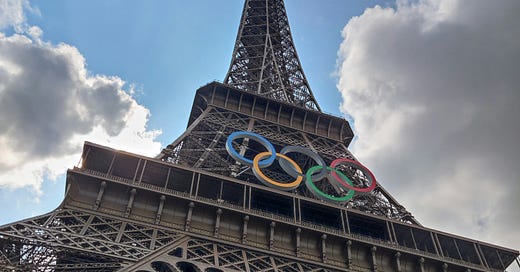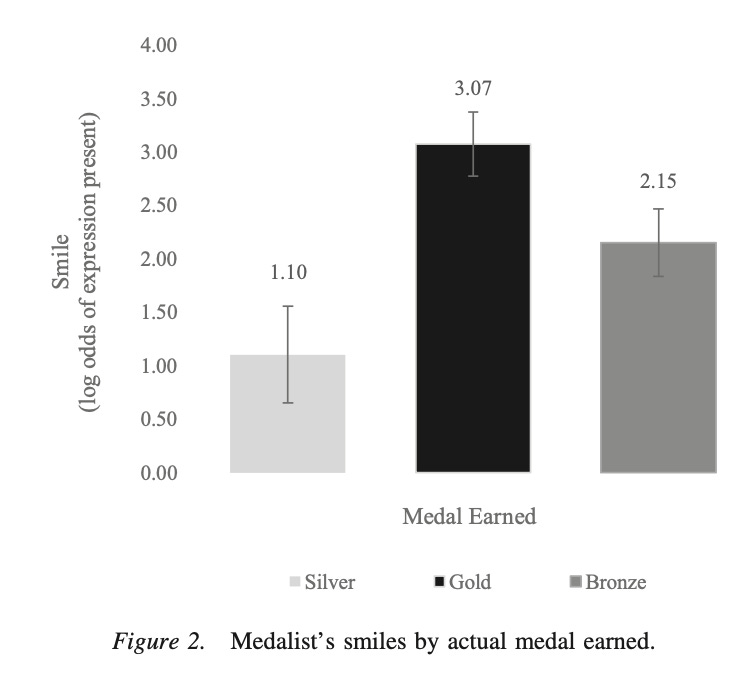Welcome to Techno Sapiens! I’m Jacqueline Nesi, a psychologist and professor at Brown University, co-founder of Tech Without Stress, and mom of two young kids. If you like Techno Sapiens, please consider sharing it with a friend today. Thanks for your support!
A quick note: next week, I’ll be writing all about school cell phone policies, including the research behind phone bans and various policy options. If you have any questions or comments about phones in schools, please send them my way. Stay tuned!
5 min read
I don’t know about you, but I love the Olympics. I cannot get enough of it. The incredible feats of human performance. The stories of overcoming adversity and setbacks. The proud parents. The memes about the Olympic Village chocolate muffins and pommel horse guy.
There is one aspect of the Games, though, that I am particularly interested in: the athletes’ feelings.1 As the runners cross the finish line, or the gymnasts look up at the final scoreboard, or the fencers…do fencing stuff,2 I find myself scrutinizing their facial expressions and post-game interviews. How do they feel about the outcome?
My husband and I, who are now supremely overconfident in our Olympics knowledge,3 were talking about this after a particularly close swimming race. Are they disappointed when they get Silver? Or maybe they’re just so happy to be there and to get a medal in the first place? What about Bronze?
Well, one of the great things about psychology research is that, if it’s about feelings, someone has probably studied it.4
And so, we interrupt our regular Techno Sapiens programming this week for a special Olympics edition answering the question: Are athletes happier when they get Silver or Bronze medals?
The research
There are roughly 11,000 athletes in the 2024 Paris Olympics. There are roughly 7.9 billion people in the world. This makes the odds of going to the Olympics about 1 in 700,000. Then, competing against the best athletes in the world, the odds of winning a medal are extremely small. One would think, then, that the experience of making it to the podium would be one of pure joy, pride, and satisfaction, no matter which medal an athlete takes home.
If nothing else, we would think that happiness with the result would progress linearly—Gold medalists would be happiest, followed by Silver, followed by Bronze.
It turns out, this is not the case.
A series of studies have now investigated athletes’ happiness after earning each type of medal.
Here’s how these studies work. Researchers collect a series of videos or images of athletes immediately after they learn of the result, and/or when they are on the podium. In earlier studies, researchers would gather participants who were unaware of the medals the athletes had won, and ask them to judge how happy the athletes looked (e.g., on a scale of 1-10, where 1=agony and 10=ecstasy). In more recent studies, these facial expressions were coded automatically by special software.
As you can see, something strange happens here. The Gold medalists are obviously thrilled, but when we compare Silver and Bronze, the Bronze medalists are actually happier than the Silver.
How could this be?
To understand why this happens, we need to talk about a concept called counterfactuals. Counterfactual thinking refers to situations when we compare an outcome to “alternative realities.” We can do this in a few different ways.
Ex post counterfactuals. This is when we think about alternate versions of the past based on what could have been. This might be something like: If only I had taken that one extra step, I would have won. Or, alternatively, Phew! One millisecond slower and I would have lost.
Ex ante counterfactuals. This is when we think about what was expected to be. This might be something like: I was supposed to win gold, and I didn’t. Or, alternatively, No one thought I would get this far and now look at me!
To investigate counterfactual thinking, studies have coded athletes’ interviews with media immediately after their events, looking for use of language about what they almost did. They also look at athletes’ expectations by comparing actual performance to medal predictions from Sports Illustrated and prior finishes in qualifying events.
In short: Silver medalists are more likely to exhibit negative “ex post” counterfactuals than Bronze medalists. They’re more likely to imagine what could have been, to focus on what they almost accomplished, and to feel less happy as a result. This is especially true when “ex ante” counterfactuals come into play—if they were expected to win Gold, and got Silver instead, they’re significantly less happy than Bronze medalists who didn’t expect a medal at all.56
Just the counterfactuals
Very few of us will ever go to the Olympics (sorry, techno sapiens), but we will certainly all engage in counterfactual thinking at some point. We all have moments of wondering what could have been, of not quite meeting expectations, of wishing we could go back in time.
One of the first studies of Olympic medalists concludes with an important distinction between automatic and elaborative counterfactual thinking. We all have automatic reactions to events, which tend toward negative views of what could have been. But elaborative thinking happens when we take a step back. When we reframe what could have been. When we choose to view an event differently, to consider what went right, or, simply, how grateful we were to be there in the first place. This is something all of us can do, whether we’re standing on the podium or watching from our couch.
And with that, we conclude our brief detour into the psychology of Olympic medals, admittedly, with only a few days left of the Games. Now, if only I’d thought to write about this last week…
Further reading
Hedgcock et al. (2021). Counterfactual thinking and facial expressions among Olympic medalists: A conceptual replication of Medvec, Madey, and Gilovich’s (1995) findings. Journal of Experimental Psychology.
McGraw et al. (2005). Expectations and emotions of Olympic athletes. Journal of Experimental Social Psychology.
Medvec et al. (1995). When less is more: Counterfactual thinking and satisfaction among Olympic medalists. Journal of Personality and Social Psychology.
A quick survey
What did you think of this week’s post? Your feedback helps me make this better. Thanks!
The Best | Great | Good | Meh | The Worst
The amount of time I spend wondering how the athletes are feeling, versus any other aspect of the Games, makes me think I chose the right profession.
If any techno sapiens know anything at all about fencing, please: explain it to the rest of us.
As may be apparent, we have been watching a lot of Olympics in our house. My toddler is particularly interested in gymnastics. So much so, that he’s taken to asking whether every person he sees on screen is Simone Biles. Seems like a positive outcome to me.
One benefit (or, maybe drawback) of having studied psychology for almost 18 years is that I have a number of random study findings tucked away somewhere in my subconscious. So, when my husband and I were talking about the Olympics, I had a sudden memory of an intro psychology class and something about Silver medalists. A not-so-quick literature search later, here we are!
One study even went so far as to create a formula to predict the happiness of Olympic athletes based on what’s called “decision affect theory.” It looks like this:
In case you’re wondering, here’s what the authors have to say about that formula: “Ro is the judged pleasure of an outcome, J is a linear function relating a feeling of pleasure to a numerical response, uo is the utility of the outcome, uE is the utility of the expected finish, and d(uo - uE) is a disappointment function that compares the outcome with the expected outcome. The last term on the right (1-so) is the complement of so, where so is the strength of the belief (i.e., subjective probability) that the outcome would occur.”
In other words: athletes feel happier when they didn’t expect to win, and also, these authors are really into the Olympics.







Very much obsessed with the Olympics too🤩 And I'd be a great experiment participant to see how the fans themselves feel about their country's medals. I'm Serbian and totally thrilled we have our 2 golds, but I doubt my American friends would feel the same about having scored two tiny medals!
I also find it fascinating to observe cultural differences in how emotions are *expressed* and that can have a huge impact on the research. For example, the reactions of the France vs South Korea archery medalists were *so* distinctly different, you would have thought the South Korean medalist wasn't as 'happy' as her French counterpart. But cultural expectations around emotional expression play a huge role in all of this.
(Sorry, geeked out here for a sec!)
Great article. The counterfactual explanation is especially visible when gold and silver are decided by a tiny margin. A great example is the 100m final from a few days ago: it was so close that they had to wait maybe 30 seconds looking at the screens while the video was checked for a photo finish. If you think you may have won gold—or even worse, if you think you've *probably* won gold—it must be intensely disappointing when you realize you were second. I feel like silver medalists usually look a lot happier when the gold medalist ran away with it unambiguously :)